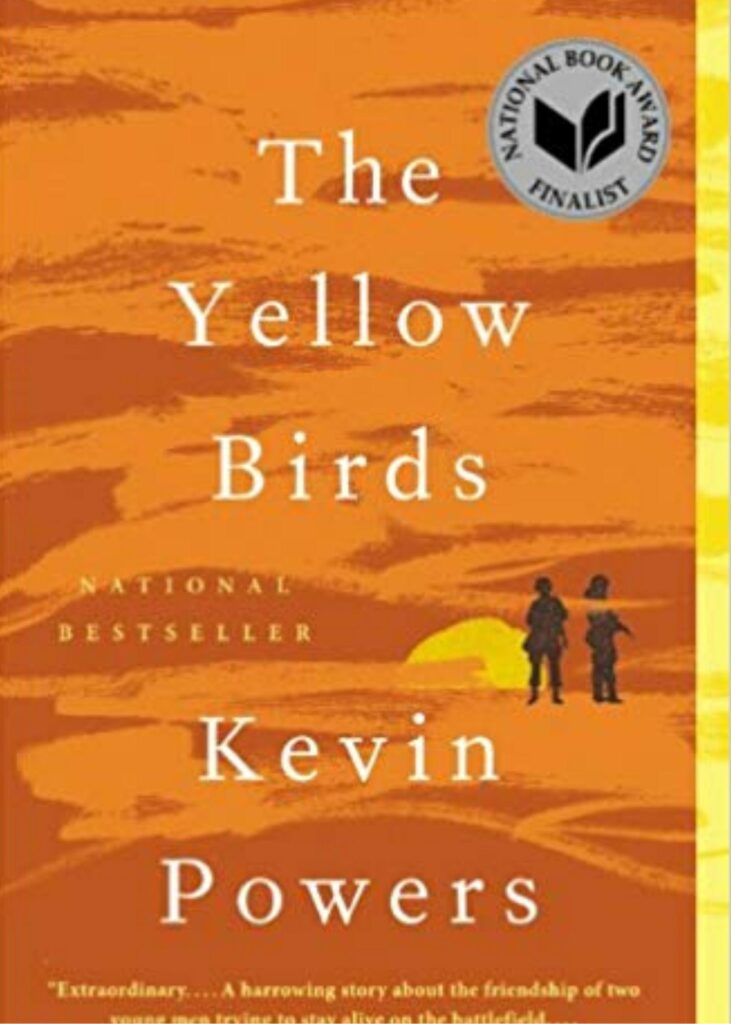“On Background” is a series of blog posts wherein I talk about the books, films, and other media that would come to inform me in writing WE TAKE CARE OF OUR OWN. My gratitude to the authors, journalists, filmmakers, and thinkers responsible for these works is hereby assumed.
At some point in the eight years of my writing We Take Care of Our Own (coming out 2020 on Montag Press), I read The Yellow Birds, a 2013 novel by Kevin Powers. It tells the story of two young privates and their efforts to stay alive during military operations in Al Tafar, Iraq. It’s a novel that looks to be well on its way toward becoming a classic of Iraq War literature, right up there with Ben Fountain’s Billy Lynn’s Long Halftime Walk and Phil Klay’s short story collection Redeployment. I’m not saying this because I actually read these books and deem them important—I didn’t, so I don’t—but it should be noted that these books, as well as The Yellow Birds, were awarded big-deal literary prizes and/or were made into Hollywood movies. If that doesn’t bode well for their future status as genre classics, I don’t know what does.
The Yellow Birds is a quick read, quicker than its 250-plus-page count suggests, with prose that might be described as spare. Of course, it seems to me that whenever a poet publishes a novel (one could not make it through a review of The Yellow Birds without learning that its author is a poet first and foremost, with an MFA from the University of Texas at Austin and a Michener Fellowship in Poetry) the prose will be described by critics as “spare.”
It should also be noted that Powers served in the Army in 2004 and 2005 in Iraq, where he was deployed as a machine gunner in Mosul and Tal Afar. So this is a guy who walked the walk before talking the talk, and we Americans ought to be thankful for his service in this particular morally bankrupt and poorly planned forever war.

And now, a confession: I don’t remember much about The Yellow Birds. I remember it ending with somebody at the top of a tower, and I vaguely recall discovering one or two military terms that I felt I could incorporate into my book, but that’s it. What I remember most about it is that I was on a plane when I finished it. I remember the sun coming in strongly through the plane windows. I was probably with my wife and kids.
This doesn’t mean I got nothing out of it or that I consider my reading The Yellow Birds a waste of time. Just because I can’t sit here and pinpoint all the little ways in which it spoke to me or educated me or otherwise helped me doesn’t mean it didn’t do all that and more. Some works dazzle you from one moment to the next while some works quietly sink in, infiltrating the reader’s psyche without their noticing. I’m inclined to think The Yellow Birds achieved this, as I sit here and skim pages, coming across passages like this:
And then it started. It seemed as if the movement of one moment to the next had its own trajectory, a thing both finite and expansive, like the endless divisibility of numbers strung out on a line. The trackers reached out from all the dark spaces in the buildings across the field, and there were many more bullets than streaks of phosphorescence. We heard them tear at the air around our ears and smack into the clay brick and concrete. We did not see Malik get killed, but Murph and I had his blood on both of our uniforms. When we got the order to cease fire we looked over the low wall and he was lying in the dust and there was a lot of blood around him.
Good, right? It starts off abstract, with notions about numbers on lines, then grows slowly more tidy and Hemingwayesque until that last detail (“and there was a lot of blood around him”) reads almost like parody, which may or may not reflect the narrator’s remove from his feelings about witnessing, if not seeing, the death of Malik, a young interpreter.
That part about the moments being finite and expansive, though—I tapped a similar vein describing one of my novel’s characters’ memories of an enemy ambush, exploring the notion of temporal flexibility in life’s most fraught and frantic moments. I remember feeling quite inspired while writing that description, but now I see I may have simply been aping the spare prose of Kevin Powers’s The Yellow Birds. Terrific. Now I need to thank him for two things.